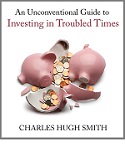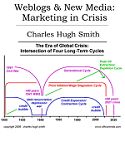

|

|
|||||||||||||
|
Is Real Food Expensive in America? (December 6, 2012) Please don't claim real food is "too expensive" to eat. What's "too expensive" is unhealthy processed and fast foods. It is a truism that food is expensive in America. What if we ask, "is real food expensive in America?" Let's define "real food" as unprocessed or minimally processed: raw fruits and vegetables, whole grains, unprocessed meat. Minimally processed would include rolled oats, 100% whole wheat bread, tofu, etc. Exhibit #1: I recently bought this real food, here in America, for less than $5: 9 oranges, large bag of mustard cabbage, large bag of Shanghai bok choi and a large bag of malabar spinach. It was not in the "half off" bin; I paid the full retail price:
Exhibit #2: all of the above, plus 30 eggs and a hand of bananas: total less than $10:
Each of these vegetables makes 4 to 6 servings, and the 2.5 dozen eggs provides plenty of protein for multiple meals. I could have added some excellent frozen fish for under $2 a pound, and cooked a few ounces per serving--a typical serving in traditional Asian cuisine, where one piece of chicken is thinly sliced and added to vegetables to feed four people. $10 in fast food might get you two "value meals" of saturated-fat burgers, fries and sugar-water drink. $10 in packaged food will buy an assortment of fake-food: frozen pizzas, snacks, sugar-bomb breakfast bars, etc. Is real food expensive in America? As a percentage of median household income ($49,777), no. Is processed or fast food expensive? If the "value" is measured in nutrition and well-being, yes, the cost is very high indeed. Apologists often cite four reasons why people (and more particularly, low-income people) tend to eat so poorly in America. One is the high cost of "real food." This is not quite true, as shown above: if you shop at Asian or Latin markets, you will find prices for fresh produce and other real food is typically much lower than in conventional supermarkets. The second reason offered is that there are no grocery stores in low-income areas. This is also not quite true, as the aforementioned ethnic markets are typically only found in low-income immigrant-friendly areas. The third excuse is that low-income people lack a proper stove/oven. The majority of Indian, Chinese and southeast Asian cuisine is prepared in one saucepan or wok that only needs one burner, a cutting board, one knife and a stirring/serving tool. The variety and healthy qualities of these cuisines are well-known. You only need one burner and a single saucepan/wok to make a huge range of healthy meals. The fourth reason given is that people work long hours and have no time to cook, especially low-income workers with long commutes on public transport. I routinely prepare a healthy meal with the above vegetables or equivalent (green beans, etc.) and a few ounces of meat in about a half hour. With a pressure cooker (widely available at garage sales, etc.), you can prepare a pot of beans or lentils (dal) in less than an hour. Compare these modest investments of time with surveys that routinely find Americans of all incomes and ethnicities watch up to four hours of TV or equivalent "entertainment" (web-surfing, videogaming, etc.) a day. Some surveys put the total even higher than four hours. So the apologists are claiming that people find four hours to watch TV, etc., but they have to stop at fast food outlets for dinner because they have no time to prepare a meal with real food. None of these excuses hold water. Even more absurdly, some apologists claim that "people don't know how to cook." With dozens of cooking shows being broadcast and thousands of recipes available to anyone with a smartphone or Internet connection, this strains credulity. There are even these useful things called cookbooks that can be borrowed from a public library. Let's also recall that up to 40% of all food in the U.S. is thrown in the garbage. Do you throw away what is costly? No, you throw away what is cheap. What it boils down to is convenience, marketing and engineering: processed food and fast-food are engineered to "taste good" (i.e. salty, fatty and sweet), marketing hypes them 24/7 and Americans have been brainwashed to worship convenience above all else. So please don't claim real food is "too expensive" to eat. What's "too expensive" is unhealthy processed and fast foods.
NOTE: I will be taking a few days off from online work, so I will be unable to
respond to email. Thank you for your understanding.
SPECIAL OFFER ON GREEN COFFEE BEANS FOR LONG-TERM STORAGE FROM EVERLASTING SEEDS: Here is a note from ES's founder: "I've successfully stabilized green coffee beans for a period of six years and still had them roast up to within 90-95% of their 'new' bouquet, smoothness, and flavour characteristics. We've finally got all of the odds and ends together, along with the best 'stove top' roaster {Whirley Pop} that we're found. The coffee beans are all 100% Organic: Peruvian, Colombian, and Guatamalean in two sizes, 1 lb. And 5 lbs. the sealed cans contain a small 'Roasting Guide' that gives basic instructions, roasting times and temps, etc. This is, by necessity, only a brief intro with the essential information, as it has to fit into our smaller, 'chowder' size can.
It's taken me nearly ten years to experiment, wait, and finally find a method that would
preserve the bean's natural flavours and oils. The other thing that suggested itself to
me is that I can think of few things, outside of the obvious 'necessities'
{Bible, beans, bullets} that would be more valuable, command a higher price, and be
virtually instantly 'tradeable' anywhere, anytime after an 'event': coffee is, in
a multitude of ways, our latter day 'comfort food.'"
My new book Why Things Are Falling Apart and What We Can Do About It is now available in print and Kindle editions--10% to 20% discounts.
Things are falling apart--that is obvious. But why are they falling
apart? The reasons are complex and global. Our economy and society have structural
problems that cannot be solved by adding debt to debt. We are becoming poorer, not
just from financial over-reach, but from fundamental forces that are not easy to identify
or understand. We will cover the five core reasons why things are falling apart:
 1. Debt and financialization
1. Debt and financialization
2. Crony capitalism and the elimination of accountability 3. Diminishing returns 4. Centralization 5. Technological, financial and demographic changes in our economy Complex systems weakened by diminishing returns collapse under their own weight and are replaced by systems that are simpler, faster and affordable. If we cling to the old ways, our system will disintegrate. If we want sustainable prosperity rather than collapse, we must embrace a new model that is Decentralized, Adaptive, Transparent and Accountable (DATA).
We are not powerless. Not accepting responsibility and being powerless are two sides of
the same coin: once we accept responsibility, we become powerful.
To receive a 20% discount
on the print edition: $19.20 (retail $24), follow the link, open a Createspace account and enter
discount code SJRGPLAB. (This is the only way I can offer a discount.)




Please click on a book cover to read sample chapters
NOTE: gifts/contributions are acknowledged in the order received. Your name and email remain confidential and will not be given to any other individual, company or agency.
"This guy is THE leading visionary on reality.
He routinely discusses things which no one else has talked about, yet,
turn out to be quite relevant months later."
Or send him coins, stamps or quatloos via mail--please request P.O. Box address. Subscribers ($5/mo) and contributors of $50 or more this year will receive a weekly email of exclusive (though not necessarily coherent) musings and amusings. At readers' request, there is also a $10/month option. What subscribers are saying about the Musings (Musings samples here): The "unsubscribe" link is for when you find the usual drivel here insufferable.
All content, HTML coding, format design, design elements and images copyright © 2012 Charles Hugh Smith, All rights reserved in all media, unless otherwise credited or noted. I am honored if you link to this essay, or print a copy for your own use.
Terms of Service:
|
Add oftwominds.com |